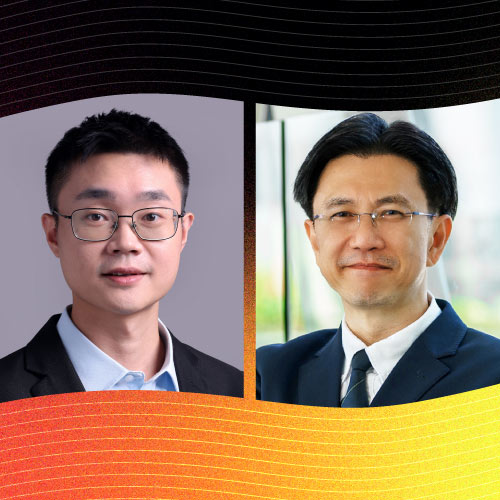Ping Koy Lam Group
Our group works on generating a variety of quantum states of light with bright coherent laser fields. Multi-partite entanglement, squeezed light and superposition states that we generate are then used for probing new physics and for quantum information applications.
The squeezed state of light has very interesting quantum noise properties. When its quadrature amplitude is measured, the measurements will show that it can be quiet than the optical "vacuum". In our lab, we can significantly reduce this vacuum fluctuations by much more than 90% (>10 dB). This extremely quiet laser beam can be turned into an ultra-precision sensor. For example, it was used in a Michelson interferometer setup in the LIGO interferometer for detecting cosmic gravitational waves. Combining squeezed light on beamsplitters allows us to generate multi-partite entanglement that is a useful resource for photonic quantum computing. By introducing photon number resolving detection our system, non-Gaussian quantum states can also be generated. Our group uses these light sources for a range of quantum applications, including quantum computing, encryption, interferometry, metrology, levitation and communications.
Our research is carried out both at A*STAR's Institute of Materials Research and Engineering (IMRE) and at the Centre for Quantum Technologies at NUS. We are looking to recruit new members to join our research.


Chief Quantum Scientist
A*STAR
Adjunct Professor
Department of Physics, Faculty of Science National University of Singapore
Lam Ping Koy’s research work includes quantum optical states generation, quantum teleportation, quantum encryption, quantum opto-mechanics, quantum levitation, optical metrology, and quantum communications. Ping Koy started his career as an engineer for Sony and Hewlett-Packard before completing his PhD at the Australian National University in 1999. He was awarded two Australian Eureka Prizes, in recognition of his research in quantum teleportation and quantum encryption in 2003 and 2006, respectively. In 2007, Ping Koy co-founded QuintessenceLabs – an award winning Australian company that commercialises quantum communication technology. More recently, Ping Koy was awarded the Australian Institute of Physics Alan Walsh Medal in recognition of his contribution to Australian Industry and was made a Laureate Fellow of the Australian Research Council. In 2020, he was elected as a Fellow of the Australian Academy of Science.
Group Members

- Ping Koy LamPrincipal Investigator
- Cho Young-WookSenior Research Fellow (A*STAR)
- Syed AssadSenior Research Fellow (ANU/A*STAR)
- Wang TaoSenior Research Fellow (A*STAR)
- Biveen ShajilalResearch Fellow (A*STAR)
- Chen XianfengResearch Fellow (A*STAR)
- Lorcan ConlonResearch Fellow (A*STAR)
- Ruvi LecamwasamResearch Fellow (A*STAR)
- Soh Jian RuiResearch Fellow (A*STAR)
- Vincent Lau Han LeongResearch Assistant
- Angela Baiju PhD student (SINGA Scholar)
- Gu Chenyue PhD student (SINGA Scholar)
- Joel Jose PhD student (SINGA Scholar)
Recent papers

- L.Conlon, Tobias Vogl, Thomas Monz, Rainer Blatt, Fabiana S. Santana, Dominic W. Berry, Falk Eilenberger, Simon K. Yung, Ivan Pogorelov, Christian D. Marciniak, Ping Koy Lam, S.Assad. (2023). Approaching optimal entangling collective measurements on quantum computing platforms. Nature Physics 3 357

- Bohan Li, Aritra Das, Spyros Tserkis, Prineha Narang, Ping Koy Lam, S.Assad. (2023). On the equivalence between squeezing and entanglement potential for two-mode Gaussian states. Scientific Reports 1 11722

- L.Conlon, Falk Eilenberger, Ping Koy Lam, S.Assad. (2023). Discriminating mixed qubit states with collective measurements. Communications Physics 1 337

- B.Shajilal, Elanor Huntington, Ping Koy Lam, S.Assad. (2023). A new entropic quantum correlation measure for adversarial systems. Scientific Reports 1 1436
- L.Conlon, Ping Koy Lam, S.Assad. (2023). Multiparameter Estimation with Two-Qubit Probes in Noisy Channels. Entropy 25 1122

- Jie Zhao, Hao Jeng, L.Conlon, Spyros Tserkis, B.Shajilal, Kui Liu, Timothy C Ralph, S.Assad, Ping Koy Lam. (2023). Enhancing quantum teleportation efficacy with noiseless linear amplification. Nature Communications 14 4745
- L.Conlon, Angus Walsh, Yuhan Hua, Oliver Thearle, Tobias Vogl, Falk Eilenberger, Ping Koy Lam, S.Assad. (2023). Testing the postulates of quantum mechanics with coherent states of light and homodyne detection.








